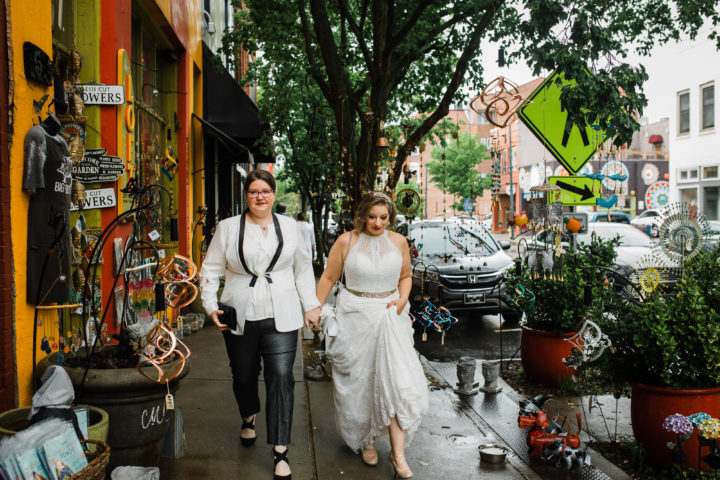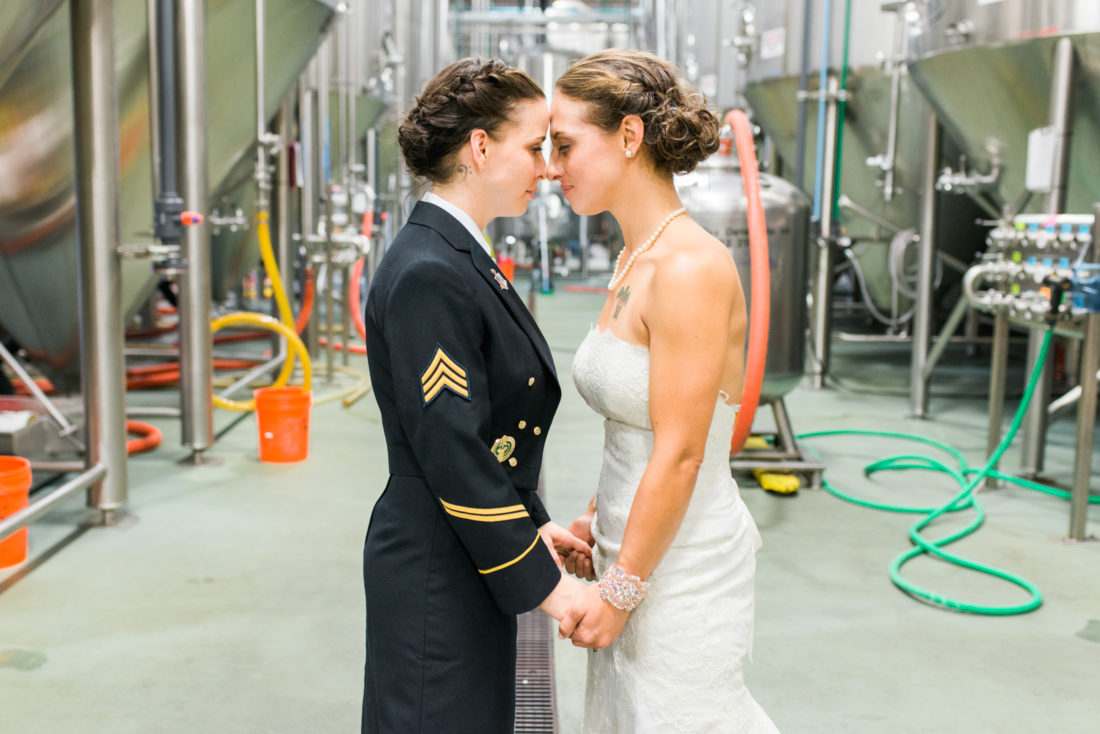For more than a decade, Jeanne Sommer of Hidden River Events has been hosting and presiding over same-sex partnership ceremonies on her farm in Swannanoa. “It doesn’t matter if it’s heterosexual or same-sex,” she says. “The ethics of good loving are what matters.”
Since 2014, when a federal court ruling overturned Amendment 1 in North Carolina and her denomination, the Presbyterian Church (U.S.A.), voted to allow same-sex marriage, Sommer has been able to offer LGBTQ couples both legally binding and religiously sanctioned marriage ceremonies.
Alex Fisher, who founded the wedding planning firm Lucky Penny Creative, says, “I knew it was headed in that direction and I wanted to be boots on the ground … so that when the ruling did come down from the Supreme Court, I was ready to rock with any couple.” Since the law changed, Lucky Penny has focused on planning weddings for a diverse set of clients. The goal, continues Fisher, is to “infuse clients’ history, partnership and how they show up in the world into their actual wedding day.”
A safe, inviting space
“I know, at the end of the day, it’s just a business and it’s just a wedding,” says Fisher. “I always say hosting a wedding is a privilege, but getting married is a right. And for us, it is taking that right and then breathing life into it.” Beyond the mechanics of putting together the ceremony and reception, “We’re creating this intimate, safe, warm, inviting space for these humans to commit their lives to one another.”
Accordingly, the business was built around the idea of helping people avoid vendors and situations that aren’t affirming. “Really, what’s at the heart of Lucky Penny Creative is my desire to help our clients navigate an industry that quite literally was never set up for them to succeed in the first place,” Fisher explains, adding that there are two kinds of problem vendors. Some try to push a “cookie-cutter wedding package scenario” so they can cycle through clients quickly. And then there are “the vendors that flat out don’t serve queer couples.”
Sommer, too, aims to ensure maximum support for her clients. “Everybody who works with us and all of our vendors are open and affirming individuals or companies,” she says. To her, that’s the first step in creating a safe space.
It’s also important, Sommer maintains, to be sensitive to the language used. “People are referred to exactly the way they want to be. Some people want to be called brides and grooms, other people want to be partners.”
Julia Albertson, one of Fisher’s go-to collaborators, has been presiding over wedding ceremonies for 15 months; during that time, she’s averaged about one per week. “My hope as an officiant is to just hold space for them to be themselves exactly as they are, and to experience their love in the way that’s most authentic for them as people.” From that starting point, Albertson weaves in narratives and elements with deep meaning for her clients, whether it’s religious rituals or books or personal beliefs.
Shifting traditions
A desire to move away from traditional religious themes and rituals isn’t unique to LGBTQ weddings, but Albertson says it’s been a factor for about half of the ones she’s worked with.
“There’s all these old-fashioned narratives that are still woven into ceremony,” Albertson explains. “I think a lot of people who aren’t in the LGBTQ community aren’t even aware that it’s a leftover template that just doesn’t really apply” in some situations. She cites such practices as giving the bride away to the groom, or vows that reflect problematic gender stereotypes.
Creative choices, though, can help address those concerns.
Asheville resident Sally Herbert walked down the aisle with her dad, but there was no formal “giving away.” Most of her in-laws, meanwhile, declined to attend the ceremony.
“My family is overwhelmingly accepting, and it’s been a much harder thing for Sarah’s family,” says Herbert. “She walked the aisle by herself, like a champ. … She owned it.”
Still, those parents’ absence led the couple to forgo some joyous traditions, since both brides couldn’t have them. They didn’t have the father-daughter dance at the reception “to keep things really balanced, so that we could enjoy moments with the family who were there” without highlighting “the fact that there were loved ones who chose not to come,” Herbert explains.
Both Randall and Michelle Skeeters say they enjoyed walking down the aisle in August 2017. Randall was escorted by both parents; Michelle walked with her mother. “I think both of us are extraordinarily fortunate to have had such support there: Everyone in our family, without hesitation, was there,” says Randall. “That’s rare within the LGBTQ community.”

Rather than emphasizing religion, the couple took most of their cues from military weddings, because Michelle’s time in the Army is a fundamental aspect of her identity. They included a sword arch, she and other participants were in uniform, and they used a sword to cut their cake. Both women opted for bridal gowns for their reception.
For Herbert, however, deciding what to wear for her May 2019 wedding was stressful. “I’m not a dress wearer, but I’m not a tux wearer either, and there’s definitely a sore lack of [clothing options] for weddings in that demographic.” In the end, Herbert chose a relatively inexpensive tailored pantsuit that she says she was happy with.
“Other than it being a same-sex wedding, I think it was a pretty typical event, and it was awesome: I wish I could do it every day,” she says. “And at the same time, I’m so glad I don’t have to do it ever again.”
For her part, Sommer thinks today’s evolving wedding practices reflect a rise in the number of people who identify as spiritual rather than religious, which leads them to question certain traditions. And sometimes, that may result in a satisfying hybrid. One of the most moving LGBTQ weddings she’s seen lately, Sommer recalls, was a Hindu celebration. The speech one of the moms made particularly impressed her. “I wish I had a copy of it. … It was so important for her that her daughter was empowered to be herself, no matter what. And it was beautiful that they were able to find, within the tradition, a priest who would wed them.”
Special challenges
Planning any wedding is no cakewalk, but there are a couple of key factors that are more likely to affect LGBTQ couples. Often, notes Fisher, they don’t get financial support from their families, which can mean increased pressure to reduce costs.
The Wedding Report, an industry research company, found that North Carolina couples spent an average of $20,416 per wedding in 2018. The same year, a study by Community Marketing & Insights, an LGBTQ market research firm, found that the vast majority of LGBTQ couples (74%) said they paid for most, if not all, of their wedding costs.
Finding friendly vendors for the full range of wedding services can also pose difficulties. Fisher describes a common scenario: In an initial discussion with a baker or stationer, “We’re talking through the logistics of a potential client relationship and they ask their names or their gender, and it gets real quiet after that point. It’s really disheartening as a planner, not just because I’m a queer human in the world, but also to have to relay that information back to the client.”
And though Randall Skeeters says she didn’t encounter such problems when planning her wedding, it was still stressful, because it felt like having to come out of the closet again and again to strangers. Despite having lived openly as a lesbian for decades, she says, “You get filled with this immense amount of anxiety and vulnerability when you’re reaching out to vendors and you don’t know how they’re going to respond.”
Joyous Union
The Skeeters chose to steer clear of convention in favor of a nonreligious wedding employing deeply personal symbolism. Neither of them had a particularly religious upbringing, and for Randall, there were some outright negative associations. “Religion can become weaponized,” she points out. “Over the years, the only people that have openly discriminated against me … have been individuals who belong to a quote-unquote ‘Christian community.’”
At the other end of the spectrum, however, both Herbert and her partner attend First Congregational United Church of Christ, and they wanted to be married by their pastor. They’d already been together for eight years, notes Herbert, “So, really, everything was more symbolic than the traditional merging of your lives. … We weren’t really afraid to break any norms: We just wanted to be recognized in front of our friends and family and church community and God in our marriage — and then just have a wicked party!”




Before you comment
The comments section is here to provide a platform for civil dialogue on the issues we face together as a local community. Xpress is committed to offering this platform for all voices, but when the tone of the discussion gets nasty or strays off topic, we believe many people choose not to participate. Xpress editors are determined to moderate comments to ensure a constructive interchange is maintained. All comments judged not to be in keeping with the spirit of civil discourse will be removed and repeat violators will be banned. See here for our terms of service. Thank you for being part of this effort to promote respectful discussion.